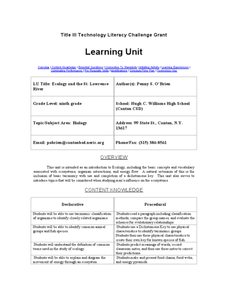Curated OER
Regents High School Examination: Living Environment 2007
Environmental science enthusiasts show what they know at the end of the year by taking this full-fledged final exam. They answer multiple choice, graph interpretation, and essay analysys questions, 73 of them in all. Topics range from...
Curated OER
Trophic Pyramids and Levels
The bulk of this lesson involves the construction of both an aquatic and a terrestrial ecosystem in which to observe trophic relationships. Detailed directions are provided, as well as discussion questions, and assessment activities....
Curated OER
Ecological Pyramids
Students apply the ecological pyramids of numbers and biomass with an activity using topographic maps. For this trophic level lesson, students work in groups using a topographic map to determine the number of organisms that can live in...
Serendip
Food Webs, Energy Flow, Carbon Cycle, and Trophic Pyramids
The reintroduction of a species to an area doesn't always go as expected. Scholars learn about the reintroduction of wolves into Yellowstone National Park with a video, reading, and discussion questions. They complete a hands-on activity...
Captain Planet Foundation
Energy Flow in the Garden
How can you tell what an owl has eaten? Study the food chain and flow of energy in an ecosystem by dissecting an owl pellet and noting the bones found inside. Additionally, the lesson includes a game about consumers and producers with a...
Curated OER
Pond Ecology
A lab activity is a great way to incite thoughtful questioning and scientific processes. Pupils will collect organisms with a Petri dish, make observations, sketch the organism, ask questions, then attempt to identify the specimen...
Curated OER
Ecology and the St. Lawrence River
Ninth graders complete a unit of lessons on ecosystems, organism interactions, and energy flow. They create a key for known species of fish, diagram the movement of energy through an ecosystem, and create and present food chains and food...
Curated OER
Ecology - Food Chains
Learners discuss the concept of a food chain in the California ecosystem. in this food chain lesson plan, students look at different cards and sort them into herbivores, carnivores, decomposers, and omnivores. Then they use these cards...
Curated OER
Nitrogen Cycle
Students identify the main concepts and ideas of the nitrogen cycle.
They review key concepts covered up to this point in ecology including food chains, food webs, energy pyramids, and bio-geochemical cycles.
Curated OER
Texas Ecoregions Summary Sheet
In this ecoregions of Texas worksheet, students complete a summary of a particular ecoregion in Texas. They find the producers and consumers of the region, they draw a food chain, the draw a food web, and they complete an energy pyramid...
Curated OER
Food Chains, Food Webs, Biomass Pyramids and Cycle
In this food chains worksheet, students complete a crossword puzzle by placing 16 terms into the puzzle that match the clues given. Students review food webs, biomass pyramids, and the water cycle.
Curated OER
Ecology and the Conservation of Natural Resources Lesson 2
Students compare and contrast abiotic and biotic factors. They discuss how these factors effect ecosystems. They answer questions to complete the lesson.
Curated OER
Food Webs
Students recognize interdependence in a food web by using yarn and notecards to create a food web and discussing what would happen if one of the organisms from a certain trophic level is removed.
Curated OER
Predator and Prey Game
Students explore the why the balance among producers, predators and prey is necessary in order for an ecosystem to be sustained over time. Through web games and activities, they discover how each component of the food chain works to...















